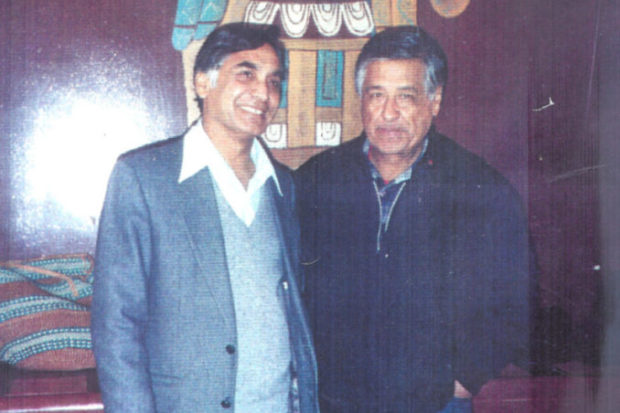
By Dr. Sudarshan Kapoor
Cesar Chavez, a legendary figure of our time, is a hero to millions who have felt inspired and empowered as a result of his exemplary life, his charismatic leadership and the nonviolent struggle he waged against social injustice experienced by his people, especially the farmworkers.
Not only was he the voice of los campesinos and for La Causa, but he also dedicated his life to the struggle and refocused our attention for the redemption of this nation. Chavez forever reversed the cycle of oppression for the farmworkers who knew him and for many others whom he never met.
With the Union
Chavez, the founder of the United Farm Workers union, was more than a labor organizer.
Most labor unions have and continue to focus on issues of justice (e.g., fair wages, better working and living conditions) and brotherhood, which are certainly central dimensions of a labor movement. But the founding of the UFW was different.
In addition to the pursuit of justice and brotherhood (sisterhood included), the union was and is totally committed to nonviolence and was guided by spirituality as Chavez was a man of intense faith and religious convictions.
Though the wage scale is the bedrock of trade unionism, Chavez went beyond that. His was a social movement that focused on several dimensions such as the human rights of the farmworkers, especially their inherent right to be treated with dignity and respect; environmental issues, particularly the use of pesticides on fruits and vegetables; weapons production that ate away at precious human resources; and the violence within us and around us.
A Nonviolent Resolution
Chavez lived by the laws of nonviolence. He ranks with Mahatma Gandhi and Dr. Martin Luther King, Jr., in advocating nonviolent social change.
Like King, Chavez was a student and follower of Gandhi.
Chavez liked to use this quote from Gandhi: “Nonviolence is not passivity in any shape or form. Nonviolence is the most active and dynamic force in the world.”
After the assassination of Dr. King, on April 4, 1968, Chavez wrote to Mrs. King: “His nonviolence was that of action…not that of contemplating action. Because of that he will always be to us more than a philosopher of nonviolence.”
Chavez believed in pursuing the goal of justice and the path of truth with a strong will, with determination and with boundless patience. Chavez challenged the status quo and made injustice visible. That is what Gandhi called the active nonviolence or Soul Force (Satyagraha).
With Gandhi as his inspiration, Chavez discovered for himself the power of purification through fasting, particularly its usefulness in overcoming the violence within us. His 25-day fast in 1968 was a testimony to his spiritual journey and it brought personal transformation.
And the Environment
Chavez’s concern for environmental violence and the use of pesticides is well known. During his later years, he vigorously opposed the use of pesticides on fruits and vegetables that were harmful to our health and which contributed to diseases like cancer.
In July and August of 1988, he conducted a 36-day “Fast for Life” to protest the pesticide poisoning of grape workers and their children. The fast raised the level of awareness in the general public about the harmful effects of pesticides. Though the controversy still goes on, Chavez played a significant role in educating the public and bringing about a ban on certain pesticides.
Chavez had a deep respect for all living beings including animal life. This was made clear by his being a staunch vegetarian. To him, it was not compatible to eat meat and pursue nonviolence at the same time.
On a Personal Note
One can write in detail about many accomplishments that Chavez had to his credit, but we must not forget that he was a humble person and led a simple life. Like Gandhi, he understood the pain and suffering of the poor. Like Gandhi, he identified with the poor masses, empowered them and uplifted them.
Chavez is regarded as a great practitioner and teacher of nonviolence. In the fall of 1989, I took a group of students to meet with Chavez at La Paz near Bakersfield. The meeting was scheduled for 15 minutes but lasted more than an hour.
We discussed a wide range of topics. At the end, we all felt moved and empowered. He left a great impact on all of us. Later that day, he joined us for lunch where he served food to us all.
I remember that experience well.
What humility. What a personal touch. What a great person he was. Thank God for His gift in Cesar Chavez, who made a difference in our lives.
The official state holiday in California to honor Chavez is not only recognition of the struggle that he waged for the betterment of working and living conditions of farmworkers who put food on our dining tables but also a step forward to empower a whole group of people to whom Chavez was their Gandhi and Dr. King. I hope soon we have a national holiday in his honor. Let us all work for it.
Si, se puede!
*****
Sudarshan Kapoor, Ph.D., is currently the chair of the Human Rights Coalition of the Central Valley. He is the founder of the Peace Garden and former founding director of the Peace and Conflict Studies program at Fresno State. Contact him at 559-435-2212 or skapoor@csufresno.edu.
